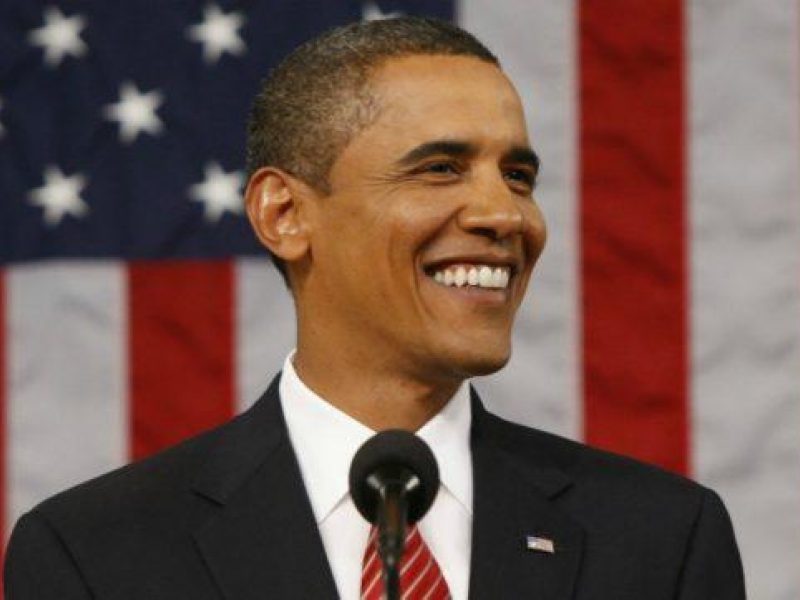Obama’s Lessons on Rhetoric
 Barack Obama
Barack Obama Rhetoric: from Aristotle to ... Obama
Rhetoric was first theorised by Aristotle in his famous homonymous text dating back to around 350 B.C., which is still topical today. According to Aristotle, rhetoric is composed of three elements:
- ethos, i.e. the personality and credibility of the speaker;
- pathos, i.e. the emotions of the audience; and
- logos, i.e. the rational of the argument.
Even if the content you are sharing is very robust and interesting, as a speaker you need to express your unique personality and style while generating emotions in your listeners. This is absolutely essential if your aim is persuading, encouraging, creating a sense of belonging, as is the case if you want to sell your product or idea, promote your own professionalism, rally and motivate your team, deliver a speech at a congress, etc.
However, this is also crucial if you are giving a more ordinary presentation on the development of a project: even if the aim is basically informative you can still be compelling and exciting to listen. Good orators enjoy a higher level of attention by their audience and are generally considered to be more intelligent and competent.
The stratagems of the trade
A few tools have been used for a long time and can be included in your speech. Let us take an outstanding speaker as a model and borrow some of his tricks.
One of my favourite speakers is Barak Obama, whose address of 4 November 2008 deserves a detailed analysis as it can be an extremely precious source of inspiration:
If there is anyone out there who still doubts that America is a place where all things are possible; who still wonders if the dream of our founders is alive in our time; who still questions the power of our democracy, tonight is your answer. … It’s the answer spoken by young and old, rich and poor, Democrat and Republican, black, white, Latino, Asian, Native American, gay, straight, disabled and not disabled – Americans who sent a message to the world that we have never been a collection of Red States and Blue States: we are, and always will be, the United States of America. It’s the answer that led those who have been told for so long by so many to be cynical, and fearful, and doubtful of what we can achieve to put their hands on the arc of history and bend it once more toward the hope of a better day. It’s been a long time coming, but tonight, because of what we did on this day, in this election, at this defining moment, change has come to America.
– Barack Obama
Needless to say that Obama is a great orator and that his speeches have always been very well prepared and skilfully delivered. In this short extract he resorted to a series of rhetorical tools that made the difference.
In the third paragraph he used the very nice and bold metaphor of the arc of history in the hands of the vulnerable, those who were disheartened and can now feel hopeful again. Well chosen metaphors immediately generate images and emotions and are remembered in the long term.
In the second paragraph he used a binary contrast between “young and old”, “rich and poor”…that conveys a sense of balance and comprehensiveness. The effect is strong and engaging.
In the first paragraph he used the rule of three by pronouncing three mirroring concepts with a pause in between. Three is considered to be the perfect number, generating a sense of completeness and harmony, further reinforced by the descending and emphatic tone at the end of the clause.
All non verbal clues are wonderfully mastered as you can easily notice in the video.
Obama consistently declared that he intended to be the President of all Americans. This is one of the reasons why he always tried to take all Americans onboard by creating a sense of belonging and ownership.
During the Iowa Caucus Victory Speech delivered on 3 January 2008, he stated:
I know you didn't do this for me. You did this -- You did this because you believed so deeply in the most American of ideas -- that in the face of impossible odds, people who love this country can change it. …. I know how hard it is. It comes with little sleep, little pay, and a lot of sacrifice. There are days of disappointment. But sometimes, just sometimes, there are nights like this: a night -- a night that, years from now, when we've made the changes we believe in, when more families can afford to see a doctor, when our children -- when Malia and Sasha and your children inherit a planet that's a little cleaner and safer, when the world sees America differently, and America sees itself as a nation less divided and more united, you'll be able to look back with pride and say that this was the moment when it all began
– Barack Obama
In this excerpt Obama intensely connects to his voters by acknowledging their protagonism in the electoral campaign and, as a consequence, promoting their sense of ownership. When referring to Malia and Sasha, he obviously empathised with them and used imagery…the image of two children inheriting a cleaner planet is engrossing. I am a visual person and a number of celestial images spring to my mind: two children joyfully holding hands and running in a flowery meadow, a soothing breeze blowing and ruffling their hair…totally irresistible…I can feel tears streaming down my face 😉
It was not infrequent for Obama to create a certain degree of ambivalence through the use of very general statements that could be interpreted by the listeners as best suited them. In this way he managed to connect to people from very different backgrounds and political stances. In his victory speech in Iowa Obama uttered the memorable line:
They said this day would never come. They said our sights were set too high.
– Barack Obama
The sentence is very powerful and ambiguous, everyone interpreted it in their very personal way and felt understood and connected to the speaker. The very mantra Obama spread during his campaign “Yes, we can” can lend itself to countless meanings, and rally people from all walks of life.
To conclude, I would like to draw your attention to the pervasive use of short and simple sentences in most of Obama’s official addresses, that shows to what extent he believed in the KISS principle and mastered it in order to deliver formidable speeches. We would be well advised to follow his example!
We can make you do it! Contact us at info@goodgoing.it.

